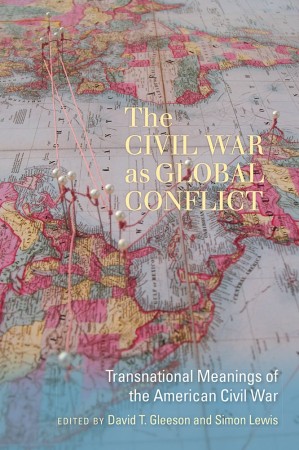The CLAW program is pleased to announce the publication of David T. Gleeson and Simon Lewis’s new book, The Civil War as Global Conflict: Transnational Meanings of the American Civil War. This edited volume developed from CLAW’s “Civil War—Global Conflict” conference, which was held at the College of Charleston in March 2011 as part of the sesquicentennial commemoration of the Civil War. It is the twentieth publication in the Carolina Lowcountry and Atlantic World book series with the University of South Carolina Press.
The Civil War as Global Conflict attempts to expand the insular national and regional narratives that have shaped much of the popular and scholarly discussions of the history of the US Civil War. As Gary W. Gallagher, Nau Professor of History at the University of Virginia and author of The Union War says, “The essays in this welcome volume place aspects of the Civil War within a spacious world context. Taking up topics that address economics, diplomacy, ethnicity, politics, gender, race, and memory, they remind us that the greatest military event in American history reverberated far beyond the shores of the United States and the Confederacy.”
Highly distinguished Civil War scholars such as James M. McPherson and Aaron Sheehan-Dean examine the struggles over slavery and sovereignty in the United States in the context of other conflicts and political developments elsewhere in the western hemisphere. Although the Civil War was the bloodiest conflict in US history, and one of the nation’s most defining events, this volume underscores that the war was by no means the only conflict that ensnared global imperial powers in the mid-nineteenth century. In some ways the Civil War was just another element in contemporary conflicts over the definitions of liberty, democracy, and nationhood occurring throughout the world.
The volume’s twelve individual essays address numerous provocative themes covering a wide array of topics, ranging from discussions of the legality of retaliation in the war, through cultural and diplomatic history, to analyses of the significance of Florence Nightingale in Civil War and post-Civil War nursing practices. The book concludes with a coda in which noted local, national, and international historians reflect on how we remember the war—what we remember and what we forget—and the reasons why we should remember the war. While we now take for granted the nation’s values of freedom and democracy, we cannot understand the impact of the Civil War and the victorious “new birth of freedom” without considering the global influences and impacts of this event
Brian Schoen, associate professor of history and director of Undergraduate Studies at Ohio University describes the volume as “highly original in conceptualization and execution” and likely to revise our understanding of the war, the broader context within which it was fought, and especially its meaning across time and space.”
A native of Ireland, David T. Gleeson is a professor of American history at Northumbria University in Newcastle upon Tyne and a former director of the College of Charleston’s Carolina Lowcountry and Atlantic World program. He is the editor of The Irish in the Atlantic World, co-editor of Ambiguous Anniversary: The Bicentennial of the International Slave Trade Bans, and author of The Green and the Gray: The Irish in the Confederate States of America.
Simon Lewis is a professor of world literature at the College of Charleston, where he is also an associate director of the Carolina Lowcountry and Atlantic World program. Lewis is the author of White Women Writers and Their African Invention and British and African Literature in Transnational Context. He is also the co-editor of Ambiguous Anniversary: The Bicentennial of the International Slave Trade Bans.
For additional information on this book and the USC Press’s Carolina Lowcountry and Atlantic World book series, please visit http://www.sc.edu/uscpress/books/2014/7325.html.

